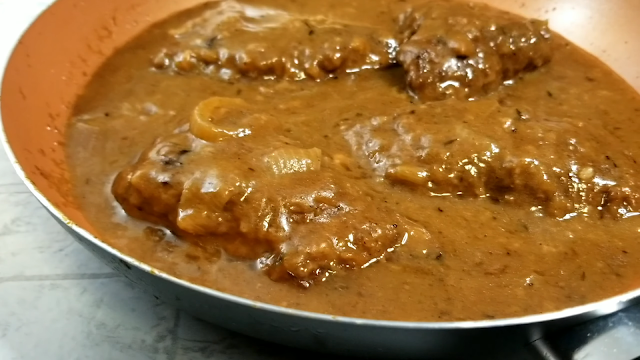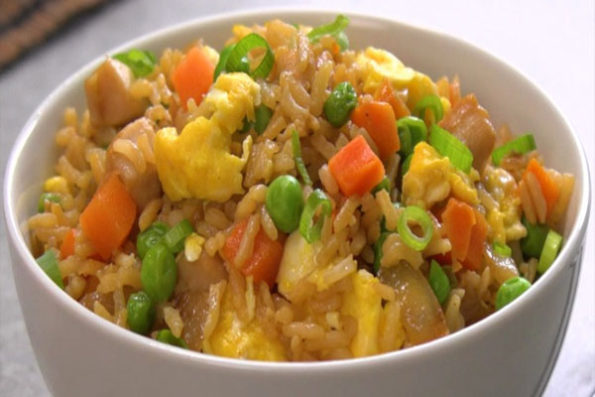SLOW COOKER CUBE STEAKS WITH GRAVY

The benefits of beef:
The consumption of meat by the people of the world in general and beef in particular has been increasing in recent times, and over time it has become an integral part of the diets of people around the world. Where red meat, which is a name given to mammalian meat in general because of its red color, and it is raw, such as beef and sheep, is one of the most important food sources of protein.
Beef represents a somewhat integrated food because it contains different types of nutrients, as it is an important source of high-quality protein because it contains essential amino acids necessary for the growth of body cells, repairing damage in cells, and maintaining immunity against diseases. It also contains mineral salts that are important for the body to carry out its vital functions, such as: iron, zinc, magnesium, selenium, and phosphorus, and it contains fats that are beneficial to human health.
Children, pregnant women, and the elderly are among the important groups to add meat to their diet because of the presence of many important nutrients to maintain their health and prevent them from diseases.
The absorption of micronutrients, such as vitamins and minerals, is affected by what is eaten during a particular meal, and given that beef contains a group of integrated nutrients, it makes the absorption of these nutrients better, such as helping the fat in meat to absorb vitamin A.
The quality of meat and its preservation of its specific characteristics depends on several factors, including: animal genes, the type of feed that is provided to them, the environment in which they exist during their life, the method of dealing with meat after slaughtering it, and the method of preserving and cooking it.
nutrients in beef
proteins
Beef contains all the essential amino acids for building body cells and is therefore considered a complete source of protein, as it constitutes 25% of the weight of the meat. Protein has an essential role in helping to recover after injuries and providing the body with the energy needed to carry out various physical activities. Proteins are also an essential material for building muscle mass in the body.
Salts and minerals
Beef meat contains a large number of salts and minerals important for the performance of body functions, such as: zinc, selenium, phosphorus, and iron, of which beef is an important source, and its absorption from animal sources is higher than from plant sources. Beef is a source of B vitamins, such as: vitamin B3, whose deficiency has been linked to heart disease according to studies, and vitamin B12, which is important in blood formation and maintaining nerve integrity.
Fats
Beef contains different percentages between 5%-10% of fat, affected by factors including the age of the animal from which it was taken and the place in the body of the animal from which it was taken. Processed meats such as sausage are higher in fat. Beef contains many unsaturated fats such as stearic acid, oleic acid, palmitic acid, and conjugated linoleic acid.
Linoleic acid plays an important role in protecting against heart disease and cancer and may contribute to weight loss, according to the results of studies.
The benefits of beef for the body
Eating beef helps maintain muscle mass and helps build it, and its importance lies especially in the elderly, given their loss of part of their muscle mass during their advancing age and because they are more susceptible to meat atrophy, in addition to athletes and patients who suffer from diseases that increase the consumption and loss of muscle mass Like cancer patients.
Eating beef improves performance during exercise by containing compounds such as carnosine, which consists of alanine, which is one of the amino acids that can be obtained by consuming meat. the time. The presence of carnosine in high levels in the body leads to improved athletic performance, increased endurance and reduced fatigue.
Eating meat prevents anemia by providing the body with iron and vitamin B12 needs. Iron deficiency is one of the most important causes of anemia. Meat helps to secure iron in a more absorbable manner than that found in plant sources, and it also helps to better absorb iron from plant sources. Studies have shown that eating meat through meals is better than taking iron supplements in treating iron deficiency in women who do physical effort during exercise.
Beef contains a group of unsaturated fatty acids such as conjugated linoleic acid, which has an important role in maintaining the health of the central nervous system and retina, and reduces inflammation in the body and has an important role, based on studies, in reducing the risk of cardiovascular disease.
Eating beef helps maintain bone health because it contains several types of amino acids, including lysine, which reduces the risk of osteoporosis in premenopausal women. Lysine also helps increase calcium absorption and collagen formation.
The fact that beef contains zinc makes its consumption important for maintaining healthy skin, hair, and nails, and the presence of zinc in the body within its normal levels is linked to fertility and the ability to reproduce.
Consuming beef helps to reduce weight by reducing appetite, increasing metabolism, reducing the feeling of hunger, and giving a person a feeling of fullness and satiety for a longer period. Studies have shown that consuming proteins increases the sensitivity of the brain to the hormone leptin, which is responsible for regulating fats and controlling the sense of hunger, and thus helping to control and reduce weight.
Ingredients
1 large onion, thinly sliced
1/3 c. all-purpose flour
1 tsp. garlic powder
1 tsp. onion powder
1/2 tsp. black pepper
6 (about 4 oz. each) beef cube steaks (I usually buy the family pack of cube steak, and cut them in half if the slices are really big-I don’t pay attention to the weight of the package, there’s always plenty of gravy)
1 Tbsp. canola oil
3 c. water, divided
1 envelope brown gravy mix (I use the reduced sodium brown gravy mix)
1 envelope mushroom gravy mix
1 envelope onion gravy mix
Hot mashed potatoes, cooked rice or cooked noodles
How To Make It:
Spray the inside of a 3-5 quart slow cooker with nonstick cooking spray. Place the sliced onions in the slow cooker.
Combine flour, garlic powder, onion powder and pepper in a large resealable plastic bag. Add steaks, a few at a time; shake until completely coated.
Heat the oil in a large skillet over medium heat. Add the steaks, a few at a time, and cook until lightly browned on each side. Place the browned steaks on top of the onions in the slow cooker. Pour 2 c. water over all. Cover; cook on Low for 8 hours or until meat is tender.
In a bowl, whisk together the 3 gravy mixes with remaining 1 c. water. Add to slow cooker; cover and cook on Low for 30 minutes longer.
Serve over mashed potatoes, rice or noodles. 6 servings.





